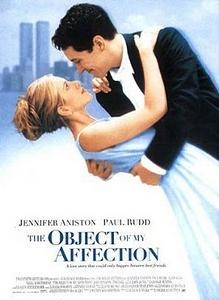 The Object of My Affection (1998) – on rental. Romantic dramas on film can be pretty formulaic: the two persons typically do not like each other terrifically i.e. the conflict phase first, but from either natural or contrived circumstances will eventually end up together i.e. the coupling ending. With interesting narratives being out of the norm, whether a romantic drama then is of any good depends on the likability of the two leads, both separately and when they’re together and if they’ve got chemistry.
The Object of My Affection (1998) – on rental. Romantic dramas on film can be pretty formulaic: the two persons typically do not like each other terrifically i.e. the conflict phase first, but from either natural or contrived circumstances will eventually end up together i.e. the coupling ending. With interesting narratives being out of the norm, whether a romantic drama then is of any good depends on the likability of the two leads, both separately and when they’re together and if they’ve got chemistry.
The Object of My Affection is a pretty old romantic comedy, relatively speaking though as it comes from (just) 11 years ago. It stars Jennifer Aniston as Nina, a New York-based social worker and counselor, and Paul Rudd as George, a gay first grade teacher. Aniston was just approaching 30 when this film was made, and she looks positively radiant and adorable (she looks, well, old today). Rudd I haven’t seen much in more recent films, but both persons are in familiar territory judging from both’s filmography. Both are likable, and don’t look or feel awkward with their individual character’s disposition.
The story revolves around Nina having a somewhat overbearing boyfriend whom she gets pregnant with, but she slowly develops feelings for George – who as already mentioned above is gay. When you’ve got a setup like this, the story can go both ways: you could get the happy ending, i.e. Gay George gives up gayism and marries Nina. Or you could get the sad ending with both going their separate ways. Affection cheats a little: it goes with the very PC route of having George remain gay, but the both still end up being together – sort of.
It’s the journey towards that ending that’s interesting though. There are two subtypes within the larger genre of romantic dramas: those that are tear jerkers, e.g. anything that’s based off a Nicholas Spark book, or those that are comedic. Affection lies somewhere in the middle. There are spots where you’ll get the sniffles, but there’re also a few light comedic moments too.
The tender moments though are surprising, and they’re mostly at the scenes when George and Nina have to deal with each other’s feelings within all the existing complications of their sexual orientations. These moments don’t feel unnatural or forced, contrived sad music in the film’s soundtrack accompanying the scenes not withstanding.
Lastly, there’s a couple of faces in the film that I recognize too: The West Wing alumnus Alan Alda and Alison Janney show up as a high-powered couple, and Steve Zahn has a minor role too.
—
On the overall, it’s a watchable film with two leads that demonstrate enough chemistry that’ll have you rooting for both to be together eventually. That the story and its ending is a little different from the norm’s a bonus.





Recent comments